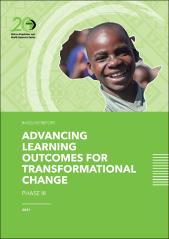Baseline Report: Advancing Learning Outcomes For Transformational Change Phase III
| dc.contributor.author | Abuya, Benta | |
| dc.contributor.author | Muhia, Nelson | |
| dc.contributor.author | Ngware, Moses | |
| dc.contributor.author | Kiroro, F | |
| dc.date.accessioned | 2023-09-01T10:12:59Z | |
| dc.date.available | 2023-09-01T10:12:59Z | |
| dc.date.issued | 2021-12 | |
| dc.identifier.uri | http://10.176.203.77/handle/123456789/298 | |
| dc.description.abstract | With the increasing 21st century demands, it has become critical for education stakeholders to ensure that education systems nurture students who are not only academically competent but also responsible, caring, and socially competent (Cristóvão, Candeias, & Verdasca, 2017). These views are emphasized by Greenberg et al (2003) who postulates that learning should go beyond basic academic skills (reading, writing, counting) to promote students’ social-emotional competence, character, health, and civic engagement. These non-academic competencies go by different names such as life skills, soft skills, 21st-century skills, transferable skills, social-emotional learning or psychosocial skills (CASEL, 2015; Cimatti, 2016; World Health Organization, 1994). | en_US |
| dc.language.iso | en_US | en_US |
| dc.publisher | APHRC | en_US |
| dc.subject | Education and Youth Empowerment | en_US |
| dc.subject | Collaborative for Academic Social and Emotional Learning | en_US |
| dc.subject | CASEL | en_US |
| dc.subject | Health Wellbeing | en_US |
| dc.subject | Social-Emotional Development | en_US |
| dc.subject | Sexual and Reproductive Health | en_US |
| dc.title | Baseline Report: Advancing Learning Outcomes For Transformational Change Phase III | en_US |
| dc.type | Technical Report | en_US |
Fichier(s) constituant ce document
Ce document figure dans la(les) collection(s) suivante(s)
-
2022 [12]

